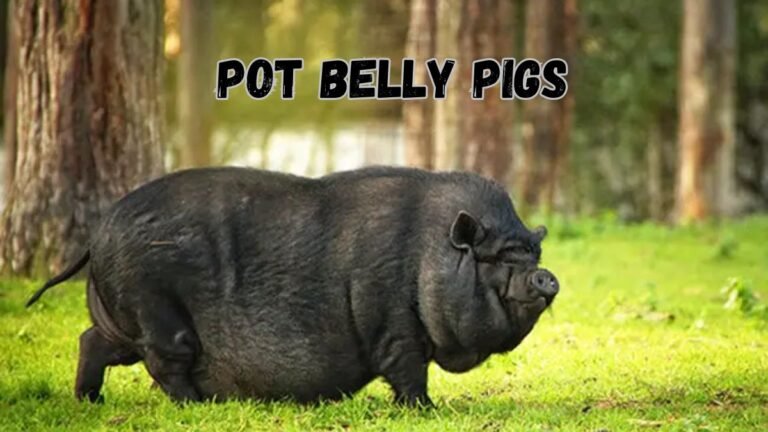Pot belly pigs, often known for their charming personalities and distinctive appearance, have become increasingly popular as pets in recent years. Despite their growing presence in households around the world, these pigs require specific care and attention to ensure they lead healthy, happy lives. In this comprehensive guide, we’ll dive into everything you need to know about pot belly pigs—from their characteristics and behavior to proper care and diet. Plus, we’ll provide a helpful comparison chart to help you make informed decisions about keeping a pot belly pig as a pet.
What is a Pot Belly Pig?
Pot belly pigs, scientifically known as Sus scrofa domesticus, are a miniature breed of pig that originated in Vietnam. They are smaller than their farm counterparts, typically weighing between 50 to 150 pounds when fully grown, though some can grow even larger. They are known for their round bellies, short legs, and distinct “pot-bellied” appearance, which is where the name comes from.
These pigs are intelligent, social animals that can form strong bonds with their owners. They have been domesticated for hundreds of years but are now primarily kept as pets due to their size and easy-going temperament. While their small size and cute appearance make them attractive to potential pet owners, it is important to understand their unique needs before deciding to bring one into your home.
Pot Belly Pig Characteristics
Size and Lifespan
Pot belly pigs are much smaller than traditional farm pigs, which makes them more suitable for living in smaller homes or apartments. Their size varies, but they typically reach about 16 to 24 inches in height at the shoulder. As mentioned earlier, their weight can range from 50 to 150 pounds. It’s important to note that some pot belly pigs can grow larger if not properly managed, which can lead to health issues.
In terms of lifespan, pot belly pigs can live up to 15 to 20 years, making them a long-term commitment. Some have been known to live even longer with proper care.
Behavior and Temperament
Pot belly pigs are known for their friendly and social nature. They are intelligent creatures capable of learning commands and tricks, similar to dogs. They are often described as affectionate and loyal, forming strong bonds with their owners. They enjoy interaction and can become lonely if left alone for extended periods of time. It’s important to keep them engaged with toys and activities to ensure they are mentally stimulated.
Despite their friendly temperament, pot belly pigs can also be stubborn and independent. Training them requires patience and consistency. It’s important to approach training in a calm, positive manner and avoid using harsh methods, as this can lead to behavioral issues.
Social Needs
Pot belly pigs are highly social animals and do best when they have plenty of interaction with people or other animals. They can get along with other pets, including dogs and cats, but it’s essential to monitor their interactions to ensure they are safe and harmonious. Pot belly pigs are also known to enjoy the company of other pigs, and it’s recommended to have at least one other pig for companionship if possible.
Pot Belly Pig Care
Diet and Nutrition
Proper nutrition is critical to the health and well-being of your pot belly pig. Their diet should consist primarily of high-quality pig pellets, which are specially formulated to meet their nutritional needs. In addition to pellets, they can also eat a variety of fresh vegetables and fruits, including leafy greens, carrots, apples, and strawberries.
However, it’s important to avoid feeding them certain foods that can be harmful, such as chocolate, onions, garlic, and excessive amounts of sugary fruits. Pot belly pigs have a tendency to gain weight quickly, so portion control is essential to prevent obesity, which can lead to serious health issues like joint problems and heart disease.
Exercise and Activity
Pot belly pigs are naturally curious and active animals, so regular exercise is essential to keep them healthy. They enjoy rooting around in the dirt, which is an instinctual behavior they use to search for food. Providing a safe, enclosed outdoor space where they can explore and root around is beneficial for their physical and mental health.
Indoor pigs will require daily playtime and exercise as well. You can use toys, puzzle feeders, and interactive games to keep them engaged. Additionally, taking them for walks (on a harness and leash) can be a great way to give them exercise and expose them to new experiences.
Housing and Living Space
Pot belly pigs can live both indoors and outdoors, but they need a safe, comfortable environment. If you choose to keep your pig indoors, make sure the space is large enough for them to move around freely. They require a warm, dry place to sleep, and many owners provide them with a comfortable bed or mat to curl up on.
If your pot belly pig will spend time outdoors, ensure the yard is securely fenced. Pigs are known to be escape artists, and they can easily root under fences or slip through small gaps. The outdoor environment should also provide some form of shelter from the elements, especially extreme heat or cold.
Veterinary Care
Regular veterinary check-ups are crucial to maintaining the health of your pot belly pig. Pigs require vaccinations and parasite control, much like other pets. Common health concerns for pot belly pigs include obesity, arthritis, heart disease, and respiratory infections. Regular wellness checks will help catch any potential issues early on.
Pot Belly Pig Health Issues
Obesity
One of the most common health issues in pot belly pigs is obesity. Their tendency to overeat, combined with a relatively sedentary lifestyle, can lead to rapid weight gain. Obesity puts extra strain on their joints and internal organs, leading to conditions like arthritis and heart disease. It’s important to monitor their diet carefully and provide opportunities for exercise to prevent this condition.
Joint Problems
Due to their small size and unique build, pot belly pigs are prone to joint problems, particularly in their knees and hips. Obesity can exacerbate these issues, so weight management is critical. Additionally, regular exercise can help keep their joints flexible and prevent stiffness.
Respiratory Issues
Pigs are susceptible to respiratory infections, especially when exposed to cold or damp conditions. If your pot belly pig exhibits symptoms like coughing, nasal discharge, or difficulty breathing, it’s important to consult with a vet promptly.
Pot Belly Pig vs. Other Pet Pigs
Many people often confuse pot belly pigs with other types of miniature pigs. To help clarify the differences, here’s a comparison chart:
| Characteristic | Pot Belly Pig | Miniature Pig | Teacup Pig |
| Size | 50-150 lbs | 35-50 lbs | 10-20 lbs (adult) |
| Lifespan | 15-20 years | 12-20 years | 12-18 years |
| Temperament | Friendly, affectionate | Social, intelligent | Often independent |
| Exercise Needs | High, needs daily activity | Moderate, needs regular play | Low, limited exercise |
| Training Difficulty | Moderate | Moderate to High | Easy to moderate |
| Health Concerns | Obesity, joint issues | Digestive issues, obesity | Health risks due to poor breeding |
| Ideal Housing | Indoor or outdoor, with space | Indoor, with some outdoor access | Indoor, with little space required |
| Popularity | Very popular as pets | Gaining popularity | Controversial due to misleading breeding |
Pot Belly Pig Myths and Facts
There are a number of myths surrounding pot belly pigs, and it’s essential to separate fact from fiction when considering adopting one.
Myth 1: Pot belly pigs stay small.
Fact: While pot belly pig’s are smaller than traditional pigs, they can still grow larger than expected. Proper diet and exercise are essential to managing their size.
Myth 2: Pot belly pigs are easy to care for.
Fact: Pot belly pigs require special care, including proper diet, exercise, social interaction, and regular veterinary visits. They are not low-maintenance pets.
Myth 3: Pot belly pigs are hypoallergenic.
Fact: While pigs generally shed less than dogs or cats, they are not hypoallergenic. People with allergies should consider their reaction before bringing a pot belly pig into the home.
Conclusion
Pot belly pig’s can make wonderful pets, but they require thoughtful consideration before adoption. With the right care, diet, exercise, and veterinary attention, these intelligent and affectionate creatures can bring joy to your home for many years. Whether you’re looking for a unique pet or an animal companion, understanding the commitment involved in caring for a pot belly pig is essential. Make sure you provide them with the environment and attention they deserve, and you’ll find that pot belly pigs can become beloved members of the family.

